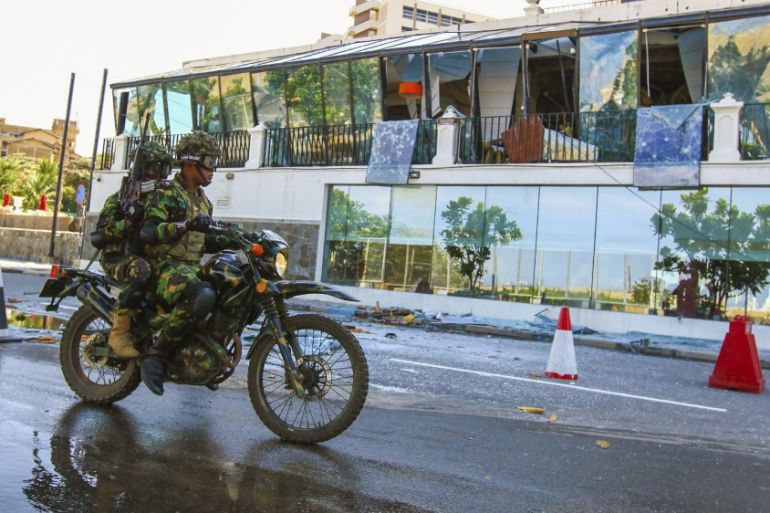A day after Sri Lanka bombings, Colombo resembles a ghost city
Climate of fear prevails over the island nation a day after the worst attacks in a decade kill 290 people.

Colombo, Sri Lanka – The Sri Lankan capital resembled a ghost town, a day after the island nation was hit by devastating bomb attacks that left people scared to leave their homes.
Parts of Colombo had transformed into a garrison, with over 1,000 security personnel deployed to ensure the city was safe, as the military and police carried out combined operations following the deadliest attacks in the past 10 years.
Keep reading
list of 4 itemsSri Lanka to probe allegation of intelligence complicity in 2019 bombings
Protest in Sri Lanka on fourth anniversary of Easter bombings
Sri Lanka ex-leader ordered to compensate Easter bombing victims
At least 290 people were killed in Easter Sunday’s coordinated attacks, which the country’s health minister said were carried out by a little-known Muslim organisation. Over 500 victims were still receiving treatment at various hospitals.
The usual hustle and bustle that is characteristic of Colombo was missing on Monday – the first working day after the country’s New Year holidays.
Shops remained closed as an occasional vehicle moved along empty roads. There was an eerie calm instead, as a dozen men in uniforms patrolled the streets in the Fort area of the capital.
Sri Lanka has gone into mourning a week after it celebrated its main national festival, the Sinhala-Tamil New Year, on April 14.
‘Senseless violence’
In Colombo’s Muslim neighbourhood of Maradana, a shopkeeper who identified himself as Segu appeared worried.
“Bad things happened yesterday. I wonder what god these people believe in,” the 67 year old said, in an apparent reference to the perpetrators of the Easter Sunday violence.
We have lost so many people in a single moment. And now we live in perpetual fear that we can never pray at our church
“There was so much commotion here, just yesterday. Ambulances were scurrying and we only heard the wailing of the wounded – and families of those victims. What a terrible day! God will never forgive this carnage,” he said, looking distressed.
Most people were not venturing out while businesses remained shut.
A single youth, who identified himself as Namal Aponso, stood at Colombo’s main railway station, which looked empty, around 10am.
He was hoping to catch a train to return to his home city of Kandy, 116 kilometres from the capital.
“I used to think we will never go back to that era,” the 28-year-old IT officer said, referring to the civil war during which blasts and violence were common.
The 36-year civil war ended in 2009 when government forces defeated Tamil separatist rebels.
“But yesterday’s violence is unthinkable. I have never seen such senseless violence,” Aponso told Al Jazeera.
About a kilometre away, at the main bus station, police recovered 87 abandoned bomb detonators later in the morning.
Christian community scarred
The bombings that targeted churches on Easter Sunday have left the Christian community scarred.
Nissansala Hemamali Cruz, 25, is a resident of Kotahena, a small township in Colombo with a strong Catholic presence.
She could not join the hundreds of worshippers that thronged St Anthony’s Church on Sunday because she was not well. Dozens were killed when the blast tore through the church.
“I feel so lucky to be alive. My younger brother who attended morning mass was injured. It could have been both of us. Our entire neighbourhood is a funeral house,” said Cruz, quietly weeping.
“Who would do this? We were to celebrate the resurrection of Jesus, who died for our sins. Now hundreds have died on Easter Sunday. Jesus can forgive these perpetrators, but how can we?
“We have lost so many people in a single moment. And now we live in perpetual fear that we can never pray at our church,” she said.